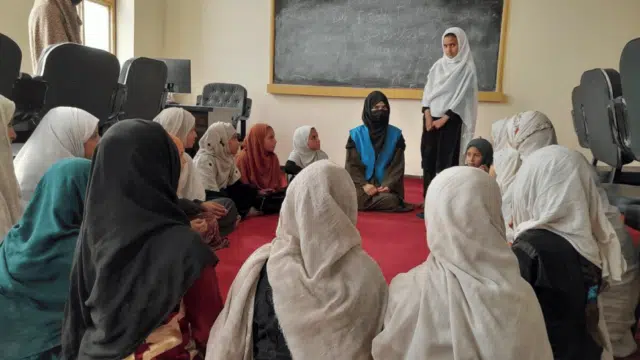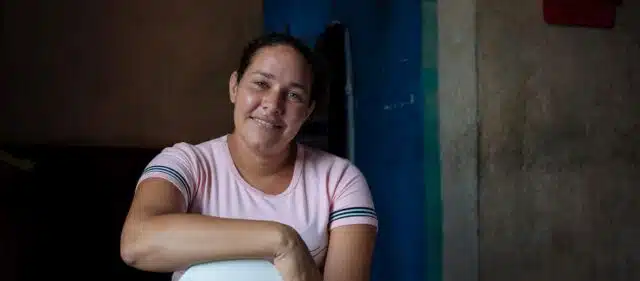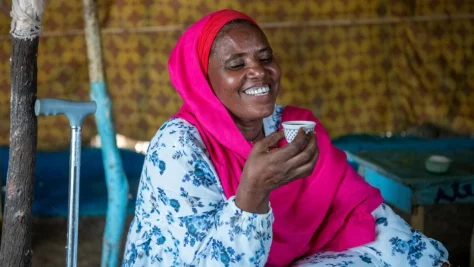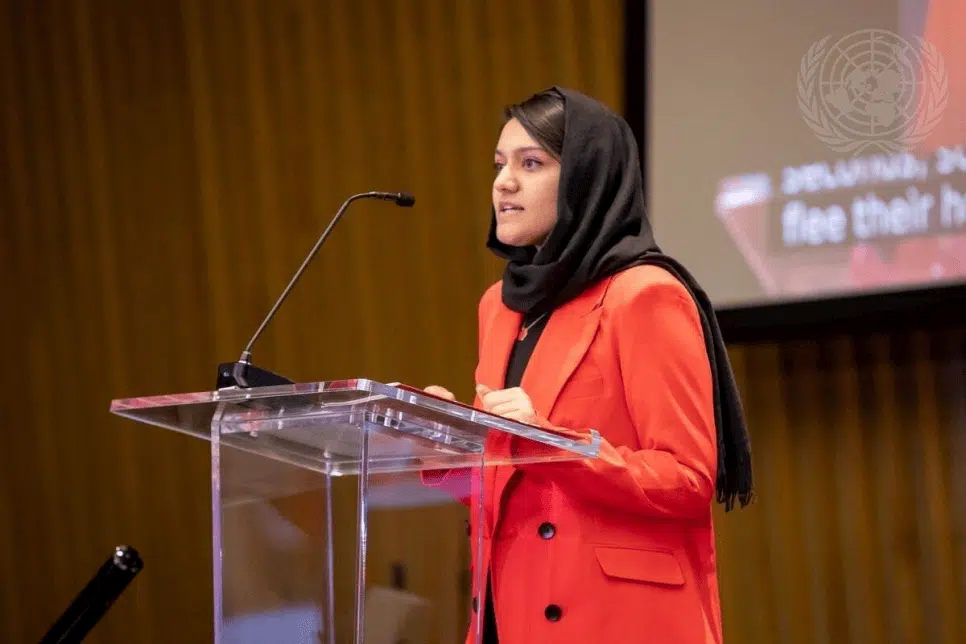
Aisha Khurram addresses the opening day of the UN General Assembly’s Transforming Education Summit in New York in September 2022. © UNESCO
With women and girls in my homeland denied their right to study, I used technology to deliver education across borders. On International Women’s Day, I call on global actors to take a stand for Afghan girls’ right to education.
By Aisha Khurram | 08 March 2023
On 15 August 2021, as the Taliban took control of Afghanistan, we were all stunned at the painful repeat of history, this time with two decades of progress for women’s rights at risk of being reduced to ashes.
Indeed, it wasn’t long before the new de facto authorities began tightening restrictions on the presence and role of women in society. Despite their early promises to preserve women’s rights, I was witness to a completely different reality on the ground. It all began with a ban on girls’ access to secondary education and was followed by a gradual erosion of women’s presence in all public spheres.
With that first decree promising nothing but a dark future for women and girls in Afghanistan, I felt I had no choice but to leave the country to continue and complete my education. On 28 August 2021, I bid farewell to my family and left my university on the brink of graduating with a law degree.
Setting out at night with a small backpack containing everything I could take from home, and hoping I wouldn’t be stopped at a checkpoint, I embarked on a long and tedious road trip towards an uncertain future.
With my brother accompanying me, we travelled the length of Afghanistan, crossing through eight provinces before reaching the border with Iran. After months of travel, I eventually sought refuge in Germany where I would have to start my life from scratch.
Like most refugees arriving in their new host communities, I found it difficult to navigate a bewildering new system. My ultimate goal was to find my way back into the classroom, but my initial attempts to enrol in a Germany university ended in failure. Language proved to be one of the most significant roadblocks, as acquiring an acceptable proficiency would have taken at least three years, after which I would have had to start my degree all over again.
During those initial months of uncertainty, displacement and desperation, I turned over every stone and knocked on every door before eventually stumbling upon an unexpected opportunity. At the end of 2021, Bard College Berlin introduced a special scholarship programme for recently displaced Afghan students, and I was among those offered a chance to continue my education in the field of politics. The university also recognized two years of my former education.
Going back to the classroom was an exceptional privilege only a very few Afghan girls have today. My excitement at getting the opportunity to resume my studies was accompanied by a deep sense of survivor guilt as millions of Afghan girls were simultaneously being deprived of their basic right to education.
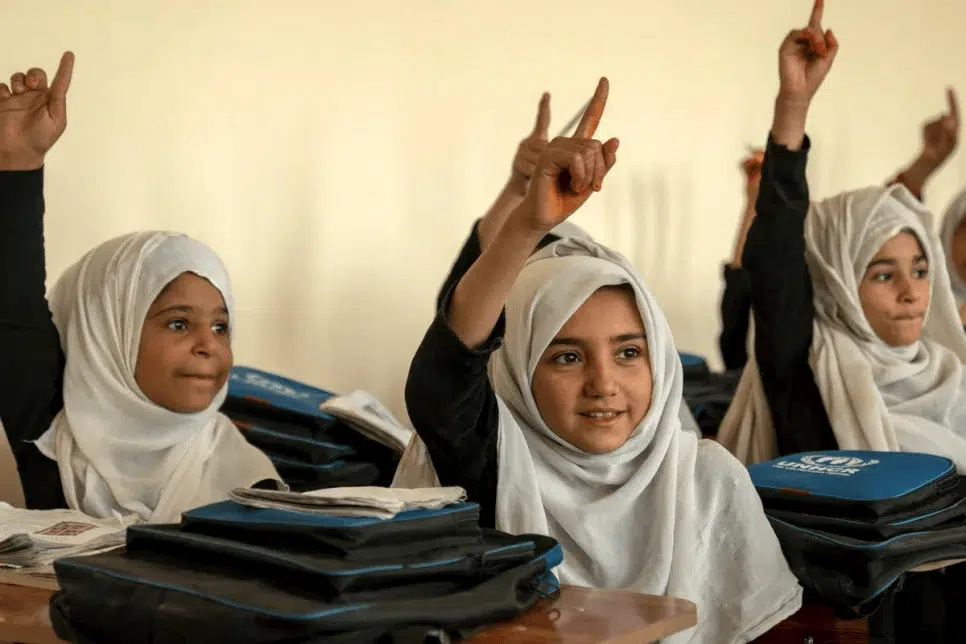
Girls in class at Lower Sheikh Mesri School in Jalalabad, Afghanistan. As girls above Year 6 cannot now go to school in Afghanistan, the premises are used for boys only in the afternoons. © UNHCR/Oxygen Film Studio
By mid-2022, the space for women and girls had shrunk even further, and women and girls in Afghanistan were taking to the streets chanting: Nan, Kar, Azadi! (Bread, Work, Freedom!). Meanwhile, more and more families were compelled to leave the country, primarily to ensure their daughters’ safety and future.
Driven by this injustice, I refused to be a passive bystander and, instead, raised my voice in support of my sisters back home. I embarked on a journey to explore solutions that could provide an alternative response to the educational crisis back home.
In February 2022, I started an initiative together with Lika Torikashvili, a peace activist from Georgia and a fellow former youth delegate to the UN. We organized a closed-door meeting to connect young female students from six different regions of Afghanistan with our respective universities in Berlin and New York.
Soon after the meeting, Bennington College in New York pledged to offer online scholarships to six female students. A trial phase that involved offering online courses with credits to the students proved the feasibility of an online education approach and raised our hopes of finding an innovative solution to the educational crisis in Afghanistan.
After a year of lobbying, we have launched a distance-learning initiative for women in Afghanistan and managed to provide online scholarships for female students with the help and academic support of universities in New York, Berlin, Kyrgyzstan and Arizona.
Ten female students in Kabul now have the chance to continue and complete their degrees through an online education model which, if successful, can be expanded to other provinces across the country.
“Education is as necessary as food and water.”
Today, Afghanistan is the only country on earth where girls are banned from attending schools and universities. Their lives are riddled with uncertainty and isolation. Our distance learning response has one clear message: Afghan girls cannot and should not wait for the political and humanitarian crisis to be resolved to access an education. For them to survive the ongoing crisis, education is as necessary as food and water.
We are living in an age of conflicts, disasters and crises where, every two seconds, someone is forced to flee their home. Higher education is an essential pathway for refugees and people in war-stricken countries, especially young women, to reclaim their agency and stability, and yet our global education systems remain far from responsive.
Today, it is more urgent than ever to embrace the power of technology in order to mark a new era of education that goes beyond borders, an era that ensures young girls from refugee camps or those living in crisis situations can have equal access to education.
On International Women’s Day, I’m calling on the international community to put its faith in education and, more importantly, in young women’s capacity for creativity and change, because these two forces when combined possess the power to illuminate the darkness and liberate humanity from the shackles of totalitarianism.
This article was written for UNHCR by Aisha Khurram who, after fleeing from Afghanistan to Germany, is now the regional leader of the Tertiary Refugee Student Network and is studying humanities at Bard College Berlin.
Originally published by UNHCR on 08 March 2023.



